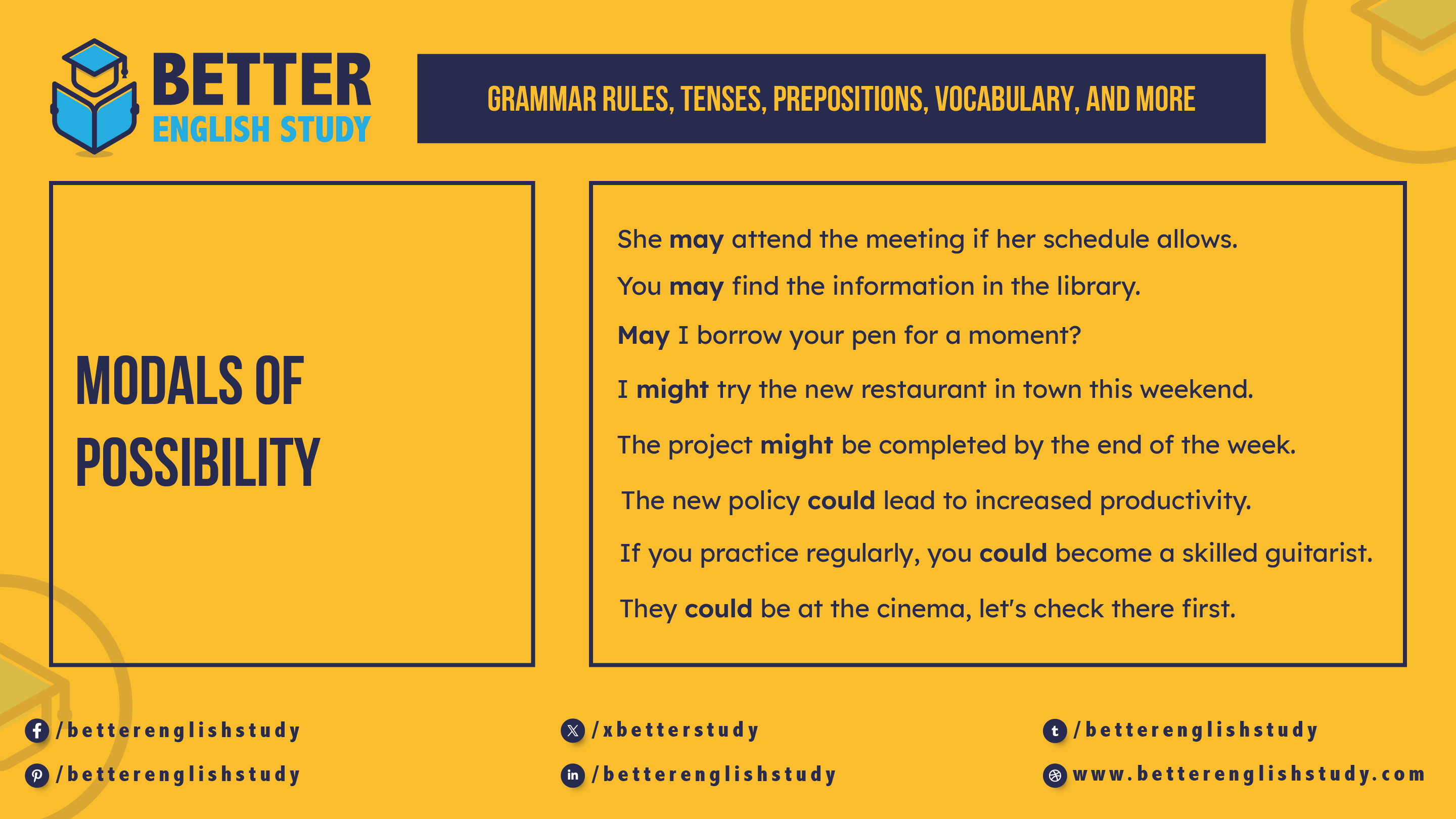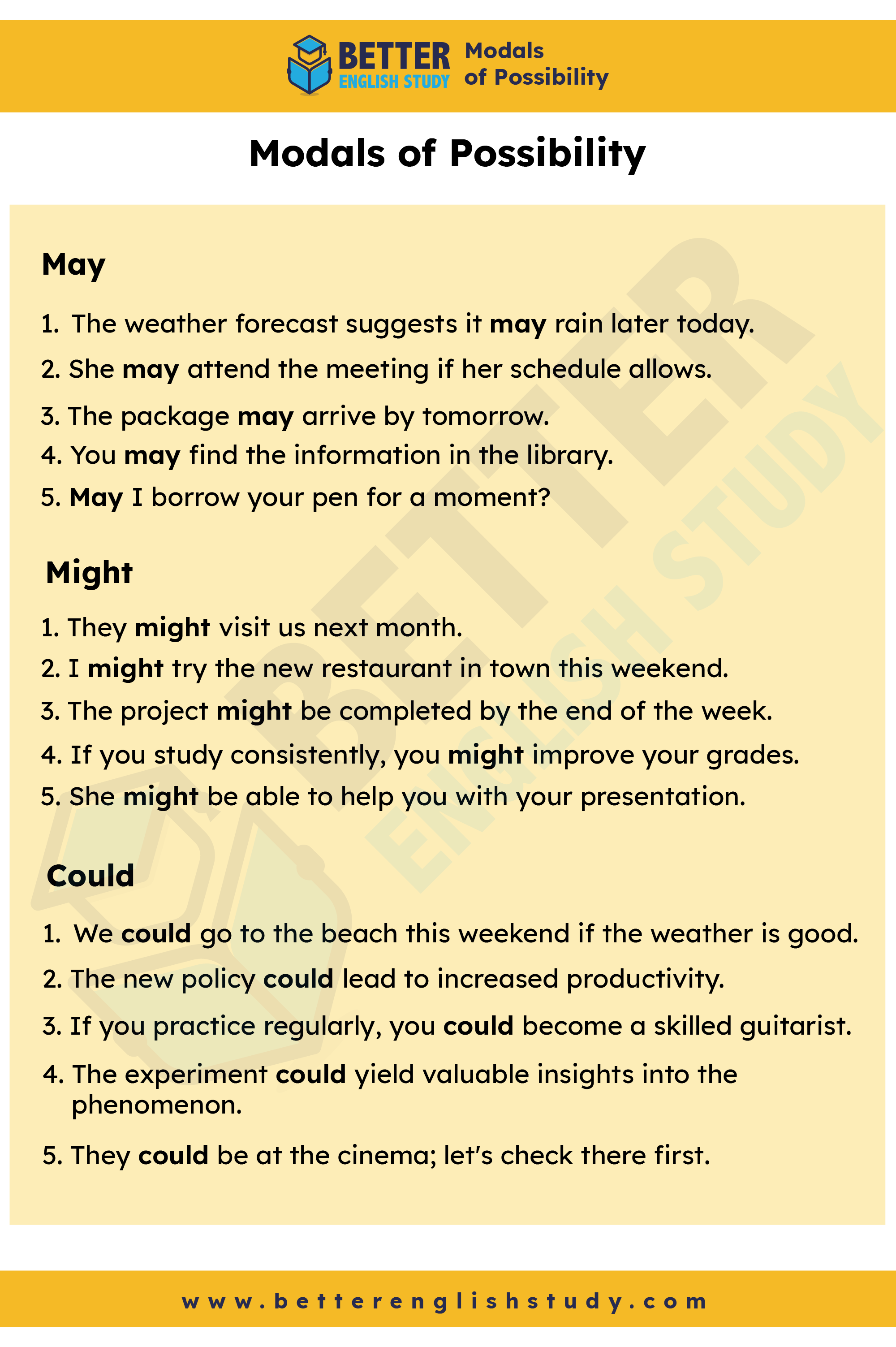
In the vast ocean of English grammar, modals serve as versatile vessels that carry the nuances of meaning. Among these, the modals of possibility – ‘may,’ ‘might,’ and ‘could’ – stand as beacons, guiding language learners through the intricacies of expressing potential outcomes.
Join us on a linguistic journey as we unravel the intricacies of these modals, providing clarity and practical examples to enhance your command of English.
Understanding Possibility
Before delving into the specifics of ‘may,’ ‘might,’ and ‘could,’ let’s establish a foundation by understanding the concept of possibility. In language, possibility refers to the likelihood or potential occurrence of an event or situation. The modals we explore here allow us to navigate this realm of uncertainty with finesse and accuracy.
Exploring Modals of Possibility
Each of these modals – ‘may,’ ‘might,’ and ‘could’ – offers a unique perspective on the likelihood of an event. Let’s delve into the distinct characteristics of each and explore how they shape the landscape of possibility.
May
‘May’ is a modal that signifies a possibility or a chance of something happening. It is often used to express a reasonable assumption or a likely event.
Examples:
- The weather forecast suggests it may rain later today.
‘May’ here implies a reasonable possibility based on the forecast.
- She may attend the meeting if her schedule allows.
This usage of ‘may’ suggests the likelihood of her attending, depending on her schedule.
- The package may arrive by tomorrow.
‘May’ conveys the possibility of the package arriving within the specified timeframe.
- You may find the information in the library.
In this context, ‘may’ indicates the likelihood of finding the information in the library.
- May I borrow your pen for a moment?
‘May’ is used here to seek permission, but it also implies a high likelihood of obtaining that permission.
Might
‘Might’ shares similarities with ‘may’ but is generally used when the possibility is less certain or when expressing a lower probability.
Examples:
- They might visit us next month.
‘Might’ implies the possibility of a visit, but with less certainty.
- I might try the new restaurant in town this weekend.
Here, ‘might’ suggests a potential action with a lower level of certainty.
- The project might be completed by the end of the week.
‘Might’ indicates the possibility of completion, but with a degree of uncertainty.
- If you study consistently, you might improve your grades.
‘Might’ here signifies the potential for improvement, but it’s not guaranteed.
- She might be able to help you with your presentation.
In this context, ‘might’ suggests the possibility of her having the ability to assist with the presentation, but it’s not certain.
Could
‘Could’ is a versatile modal that, among its various uses, can express a possibility or a hypothetical situation.
Examples:
- We could go to the beach this weekend if the weather is good.
‘Could’ in this sentence expresses the possibility of going to the beach, contingent on favorable weather conditions.
- The new policy could lead to increased productivity.
Here, ‘could’ suggests a potential outcome resulting from the new policy.
- If you practice regularly, you could become a skilled guitarist.
‘Could’ indicates the possibility of becoming a skilled guitarist through consistent practice.
- The experiment could yield valuable insights into the phenomenon.
In this context, ‘could’ expresses the potential for the experiment to provide valuable insights.
- They could be at the cinema; let’s check there first.
‘Could’ is used to suggest the possibility of their location at the cinema.

Rules for Navigating Possibility with Modals
When using ‘may,’ ‘might,’ and ‘could’ to express possibility, it’s essential to keep a few rules in mind:
- Degree of Certainty: ‘May’ is often used for higher certainty, ‘might’ for moderate certainty, and ‘could’ for lower certainty or when considering hypothetical situations.
- Context Matters: Consider the context of the situation when choosing the appropriate modal. Each modal can convey a different level of likelihood based on the context in which it is used.
- Positive and Negative: Modals of possibility can be employed in both positive and negative sentences to convey the presence or absence of the potential event.
- Permission and Ability: While ‘may’ is commonly used for permission, ‘might’ can indicate the possibility of ability, and ‘could’ can express both possibility and ability.
As we sail through the linguistic sea of modals, ‘may,’ ‘might,’ and ‘could’ emerge as essential navigational tools when expressing possibilities in English. By mastering the distinctions between these modals, you gain the ability to articulate degrees of certainty and navigate the uncertain terrain of language with precision.
So, embrace the nuances, practice with diverse examples, and unlock the full potential of modals in expressing possibility in English. The journey may be uncertain, but armed with the right modals, you’re well-equipped to navigate the vast sea of linguistic possibilities.
